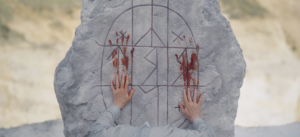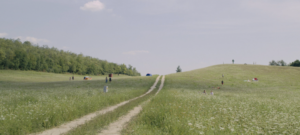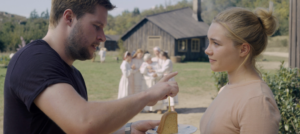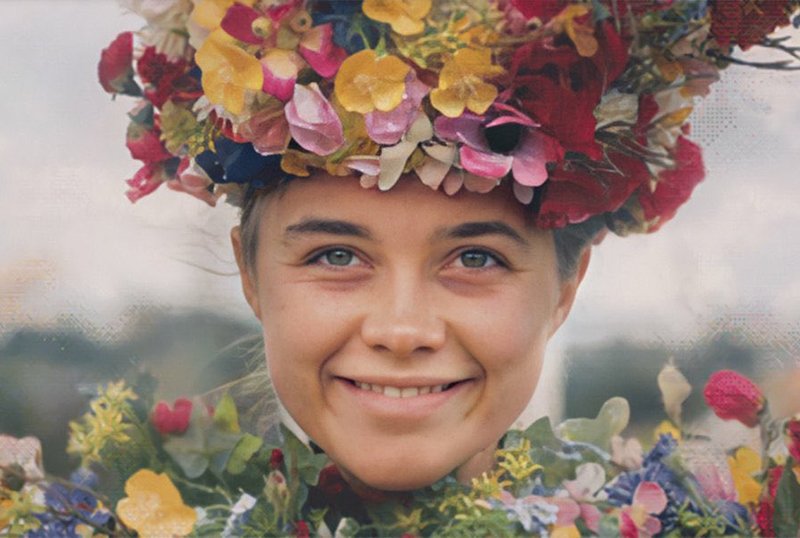Mind-bending and psychologically disconcerting, director Ari Aster’s Midsommar (2019) entices psychological thriller fans and horror fanatics alike with its gruesome qualities. Despite bearing a slow outset and questionable take on foreign culture, this film exhibits brilliant scenes of nature while simultaneously telling an unsettling yet perfectly produced story of misconceived friendship and “sacrifice.”

Sacrifice of the Elders.
After the death of her mother, father, and bipolar sister, Dani—an emotionally distraught twenty-something played by Florence Pugh—follows her boyfriend and his friends to the deep countryside of Sweden; a place of unexpected psychological terror. Here, they embark on a journey led by psychedelic drug ceremonies and unwarranted cultural practices seeming far too out of the ordinary. Soon a peaceful trip of cultural rumination and leisure spirals into a brainwashed search for reality.

A visual from Dani’s first psychedelic trip on LSD.
In an era of mediocre horror brimming with jump scares and imperfect plots, Midsommar is a breath of fresh air for film fanatics. The movie effectively reaches out to a wide-ranging audience—just about anyone can appreciate a well-rounded plot filled with beautiful scenery and a wicked storyline. The film is produced in a way that allows viewers to gradually cultivate a relationship with the characters and understand their personalities and backgrounds. The protagonist, Dani, is especially pinpointed to the audience as her fears surrounding her boyfriend cumulatively lead to the deterioration of their relationship as the movie draws on.

Christian forgets Dani’s birthday.
Furthermore, Dani’s relationship with Christian—played by Jack Reynor— is symbolically portrayed through most of the movie. This rhetorical device, along with foreshadowing, propel the plot along, ultimately making the film all the more intriguing. Midsommar is filled with a fortitude of elements and hidden depths capable of leaving anyone left pondering its meaning for hours afterwards. Likewise, this film is just as visually pleasing as it is intellectually pleasing. Upon leaving the tragic setting of Dani’s town and the brutal scenes composed there, the producer utilizes juxtaposition with a drastic change in setting. Viewers mistakenly shift their notions over the film when a new pastoral scene is introduced. As the camera takes us through the rolling hills of Sweden, an aura of harmonious tranquility feeling suspiciously hushed leads us to question what will happen next. This pattern of change continues from then on throughout the movie in an effort to keep audience members on the edge of their seats. The entirety of the film’s setup exudes a tremendous level of suspense slowly building towards the final climax.
Ultimately, the main purpose of Midsommar is to entertain viewers with the element of terror. However, while the film is unprecedentedly noteworthy for its ways of production, the conceptions it contrives in regard to uncontacted tribes and their purpose might not be culturally – or politically – accurate in the eyes of some people. While the film does not outright demean all religious practices, it does insinuate some negative notions over “non-contemporary” religions. Even so, overlooking this minuscule flaw in the make-up of Midsommar and solely focusing on the construction of the film itself, most would consider it a masterpiece of sorts in the horror film community. Arguably, the most important aspect of horror is suspense. In order for anyone to happily sit through a 2.5-hour long movie, the suspense must be considerably profound in nature. All in all, a person can take as much out of this movie as they would like to, and still enjoy it. The simple, most surface level analysis of Midsommar is entertaining. But, the film is capable of being further appreciated by anyone willing to take the time and divulge into its beast-like perplexities. So, with Halloween approaching, make the most of the spooky season by checking out Midsommar—a film certain to leave you in a state of trepidation and unease.


Recent Comments